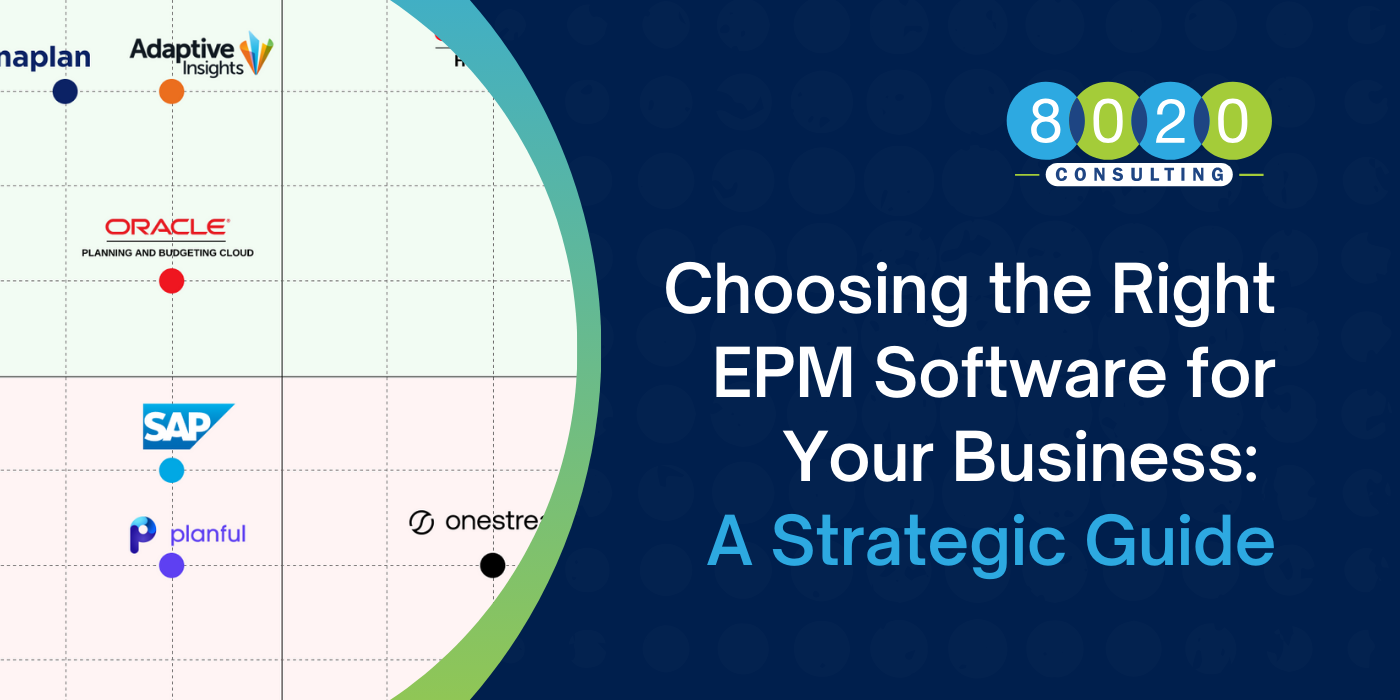
As businesses grow, managing financial data and performance becomes increasingly complex. For many organizations, adopting an Enterprise Performance Management (EPM) system is key to streamlining financial operations and making better decisions. However, with numerous EPM solutions available, selecting the right one can be overwhelming. This guide breaks down key considerations and leading platforms to help you make an informed decision.
Key TakeawaysHere are the key things you need to know about choosing the right EPM software for your business:
|
Table of Contents:
- Why Your Business Needs an EPM Solution
- Key Features to Consider in EPM Software
- Top EPM Solutions on the Market
- Enhance Your Financial Performance with the Right EPM Solution
Why Your Business Needs an EPM Solution
As your business expands, managing financial and performance data through manual processes or disconnected systems can become a bottleneck. An EPM solution provides the structure and automation needed to streamline critical tasks like budgeting, forecasting, and financial reporting.
“The right EPM solution, when correctly matched to a business, delivers the productivity, capability, and agility that enterprises need to navigate economic, social, and political volatility. It ensures CFOs can move away from traditionally complex systems toward more integrated, intuitive solutions that enrich reporting and financial management.” — Allan Saffy, Director of EPM Solutions at Decision Inc.
Key benefits of adopting EPM software include:
- Centralized Data: EPM systems provide a single source of truth for financial and operational data, improving accuracy and consistency.
- Automation: Automating routine tasks such as data consolidation frees up your finance team to focus on high-level strategy.
- Informed Decision-Making: EPM platforms offer real-time insights that empower leaders to make data-driven decisions with confidence.
Key Features to Consider in EPM Software
When choosing EPM software, it’s important to evaluate your organization’s unique needs. Consider the following features:
- Scalability: Your EPM solution should grow with your business. Tools like Oracle Hyperion are known for handling complex, multi-entity organizations, while simpler options may suffice for smaller companies.
- Integration Capabilities: Select software that integrates well with your existing ERP and financial tools. For example, SAP BPC integrates seamlessly with SAP ERP, offering enhanced performance for companies already using SAP.
- User Experience: Ease of use is critical. A steep learning curve can delay implementation, so user-friendly platforms like Adaptive Insights are designed for quicker deployment and intuitive use.
For companies seeking ERP expertise, see 8020 Consulting's ERP implementation services for guidance on maximizing integration capabilities.
Top EPM Solutions on the Market

Here’s an overview of leading EPM platforms with links for further details:
Oracle Hyperion
- Best for Large Enterprises
- Pros: Comprehensive financial consolidation, planning, and analytics. Highly customizable and integrates with other Oracle tools, making it ideal for large organizations.
- Cons: Steep learning curve and higher implementation costs, which may be challenging for smaller businesses.
SAP BPC (Business Planning and Consolidation)
- Best for SAP Users
- Pros: Integrates seamlessly with SAP ERP, offering real-time collaboration and process automation. Known for strong financial reporting features and data integration.
- Cons: The complexity of implementation and high resource requirements may not be suitable for smaller businesses.
OneStream XF
- Best for Growing Businesses
- Pros: Unified platform for financial consolidation, reporting, and analytics. Flexible and scalable, making it a strong option for growing businesses.
- Cons: Higher upfront costs and fewer third-party integrations can be limiting for some organizations.
Anaplan
- Best for Complex Real-Time Planning
- Pros: Cloud-based platform ideal for real-time planning across multiple business units. Scalable with strong collaboration features, suitable for large, dynamic organizations.
- Cons: Requires significant initial setup and expertise; the pricing model may be high for smaller companies.
Adaptive Insights (Workday Adaptive Planning)
- Best for Midsize Organizations
- Pros: Known for ease of use and quick deployment, with strong budgeting and forecasting tools. Integrates seamlessly with Workday’s HCM/HRIS, ideal for companies with large employee bases.
- Cons: Limited functionality for complex financial consolidation needs compared to larger platforms.
Planful (formerly Host Analytics)
- Best for Mid-Market Companies
- Pros: Cloud-based solution providing strong financial planning and analysis capabilities at a reasonable price. Suited for mid-sized organizations seeking a cost-effective solution.
- Cons: Limited functionality for very large or complex enterprises. Some users report limited customization options.
Oracle PBCS (Planning and Budgeting Cloud Service)
- Best for Oracle Ecosystem Users
- Pros: Part of Oracle’s cloud suite, PBCS integrates with other Oracle tools and provides comprehensive planning, budgeting, and forecasting capabilities.
- Cons: Higher costs and extensive training requirements make it better suited for larger organizations.
Enhance Your Financial Performance with the Right EPM Solution
Investing in the right EPM software can significantly improve your company’s financial processes, enabling faster, data-driven decision-making and streamlined operations. Take the time to evaluate your specific needs, assess potential solutions, and seek expert advice to ensure the best fit for your business.
Ready to optimize your financial systems and unlock greater efficiency? Connect with 8020 Consulting for a consultation.



